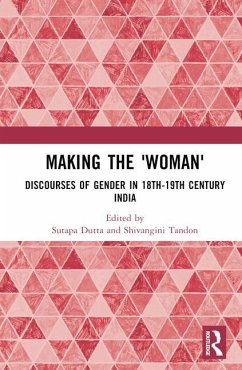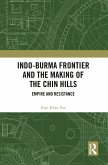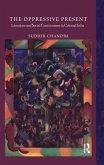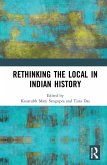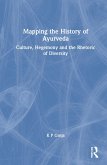Making the 'Woman'
Discourses of Gender in 18th-19th century India
Herausgeber: Dutta, Sutapa; Tandon, Shivangini
Making the 'Woman'
Discourses of Gender in 18th-19th century India
Herausgeber: Dutta, Sutapa; Tandon, Shivangini
- Gebundenes Buch
- Merkliste
- Auf die Merkliste
- Bewerten Bewerten
- Teilen
- Produkt teilen
- Produkterinnerung
- Produkterinnerung
The book examines the representation of women, their agency and subjectivity, and gender relations in 18th and 19th-century India. The essays in the volume interrogate notions and discourses of 'women' and 'gender' during the period, historically shaped by multiple and even competing actors, practices and institutions.
Andere Kunden interessierten sich auch für
![Indo-Burma Frontier and the Making of the Chin Hills Indo-Burma Frontier and the Making of the Chin Hills]() Pum Khan PauIndo-Burma Frontier and the Making of the Chin Hills55,99 €
Pum Khan PauIndo-Burma Frontier and the Making of the Chin Hills55,99 €![Indo-Burma Frontier and the Making of the Chin Hills Indo-Burma Frontier and the Making of the Chin Hills]() Pum Khan PauIndo-Burma Frontier and the Making of the Chin Hills180,99 €
Pum Khan PauIndo-Burma Frontier and the Making of the Chin Hills180,99 €![The Oppressive Present The Oppressive Present]() Sudhir ChandraThe Oppressive Present49,99 €
Sudhir ChandraThe Oppressive Present49,99 €![Rethinking the Local in Indian History Rethinking the Local in Indian History]() Rethinking the Local in Indian History180,99 €
Rethinking the Local in Indian History180,99 €![Mapping the History of Ayurveda Mapping the History of Ayurveda]() K P GirijaMapping the History of Ayurveda189,99 €
K P GirijaMapping the History of Ayurveda189,99 €![The Tamil Separatist War in Sri Lanka The Tamil Separatist War in Sri Lanka]() Channa WickremesekeraThe Tamil Separatist War in Sri Lanka199,99 €
Channa WickremesekeraThe Tamil Separatist War in Sri Lanka199,99 €![The Calcutta Kerani and the London Clerk in the Nineteenth Century The Calcutta Kerani and the London Clerk in the Nineteenth Century]() Sumit ChakrabartiThe Calcutta Kerani and the London Clerk in the Nineteenth Century58,99 €
Sumit ChakrabartiThe Calcutta Kerani and the London Clerk in the Nineteenth Century58,99 €-
-
-
The book examines the representation of women, their agency and subjectivity, and gender relations in 18th and 19th-century India. The essays in the volume interrogate notions and discourses of 'women' and 'gender' during the period, historically shaped by multiple and even competing actors, practices and institutions.
Hinweis: Dieser Artikel kann nur an eine deutsche Lieferadresse ausgeliefert werden.
Hinweis: Dieser Artikel kann nur an eine deutsche Lieferadresse ausgeliefert werden.
Produktdetails
- Produktdetails
- Verlag: Routledge India
- Seitenzahl: 242
- Erscheinungstermin: 13. Dezember 2023
- Englisch
- Abmessung: 240mm x 161mm x 18mm
- Gewicht: 531g
- ISBN-13: 9781032609041
- ISBN-10: 1032609044
- Artikelnr.: 68713901
- Herstellerkennzeichnung
- Libri GmbH
- Europaallee 1
- 36244 Bad Hersfeld
- gpsr@libri.de
- Verlag: Routledge India
- Seitenzahl: 242
- Erscheinungstermin: 13. Dezember 2023
- Englisch
- Abmessung: 240mm x 161mm x 18mm
- Gewicht: 531g
- ISBN-13: 9781032609041
- ISBN-10: 1032609044
- Artikelnr.: 68713901
- Herstellerkennzeichnung
- Libri GmbH
- Europaallee 1
- 36244 Bad Hersfeld
- gpsr@libri.de
Sutapa Dutta is a Professor of English at Gargi College, University of Delhi. Her research interests and publications are focused on 18th- and 19th-century writings and cover gender, education and identity in colonial India. She is a Fellow of the Royal Historical Society, London, and was a Fellow at the Indian Institute of Advanced Study (IIAS), Shimla, from 2018 to 2020. She has authored British Women Missionaries in Bengal, 1793-1861, British Women Travellers: Empire and Beyond, 1770-1870 (ed.) and Mapping India: Transitions and Transformations, 18th-19th Century (co-ed). Her latest book is titled Disciplined Subjects: Schooling in Colonial Bengal. Shivangini Tandon is an Assistant Professor in History at Women's College, Aligarh Muslim University. Her research interests include Early modern South Asian history, Feminist theory and questions of Language. She did her B.A. and M.A. from St. Stephen's College, PhD in History from Delhi University and is a former Visiting Fellow at the Max Planck Institute for Human Development, Germany. She has been invited to many national/international forums as a speaker. Her articles have been published in edited books and journals like the Indian Historical Review, Journal of South Asian History & Culture and by Nehru Memorial, New Delhi. She is the recipient of prestigious fellowships/awards like the Max Planck India Mobility Grant, Sanwa Bank Scholarship and the ICHR foreign travel grant.
Introduction Part I -The Private and the Public Worlds 1. Interrogating the
Colonial categorization of female dancers: The case of Hafizas in Kashmir
2. Redefining the 'Private' as 'Public': Representation of the Awadhi
zenana as an instrument of the state in the Ishqnama Part II - Questioning
the Normative 3. The Politics of 'becoming' a Mirza: Shifting masculine
norms and gender binary in the Mughal society 4. Virangana women: Dalit
counter-histories of 1857 5. Gender and 'Tribal' identity in western India
6. Could Kali be Bharat Mata? Interrogating iconicity in Indian goddesses
Part III - The Problematic 'Others' 7. Looking beyond a glorified past:
Re-examining the category of the Tawaif in eighteenth--century Awadh 8.
Re-Imagining Tawaifs: A study of courtesans in eighteenth-century Delhi 9.
Leaving a lineage in stone: Eunuchs in socio-spatial setup of Mughal India
Narratives of Femininity 10. Situating Women in Tamil Mahabharatas:
Questioning Frames, Breaking Moulds 11. Conceptualising the girl child in
eighteenth and nineteenth-century Bengal through Aagomoni songs 12. The
emerging 'Woman': Women's writing and the contours of domesticity and
femininity in colonial Assam
Colonial categorization of female dancers: The case of Hafizas in Kashmir
2. Redefining the 'Private' as 'Public': Representation of the Awadhi
zenana as an instrument of the state in the Ishqnama Part II - Questioning
the Normative 3. The Politics of 'becoming' a Mirza: Shifting masculine
norms and gender binary in the Mughal society 4. Virangana women: Dalit
counter-histories of 1857 5. Gender and 'Tribal' identity in western India
6. Could Kali be Bharat Mata? Interrogating iconicity in Indian goddesses
Part III - The Problematic 'Others' 7. Looking beyond a glorified past:
Re-examining the category of the Tawaif in eighteenth--century Awadh 8.
Re-Imagining Tawaifs: A study of courtesans in eighteenth-century Delhi 9.
Leaving a lineage in stone: Eunuchs in socio-spatial setup of Mughal India
Narratives of Femininity 10. Situating Women in Tamil Mahabharatas:
Questioning Frames, Breaking Moulds 11. Conceptualising the girl child in
eighteenth and nineteenth-century Bengal through Aagomoni songs 12. The
emerging 'Woman': Women's writing and the contours of domesticity and
femininity in colonial Assam
Introduction Part I -The Private and the Public Worlds 1. Interrogating the
Colonial categorization of female dancers: The case of Hafizas in Kashmir
2. Redefining the 'Private' as 'Public': Representation of the Awadhi
zenana as an instrument of the state in the Ishqnama Part II - Questioning
the Normative 3. The Politics of 'becoming' a Mirza: Shifting masculine
norms and gender binary in the Mughal society 4. Virangana women: Dalit
counter-histories of 1857 5. Gender and 'Tribal' identity in western India
6. Could Kali be Bharat Mata? Interrogating iconicity in Indian goddesses
Part III - The Problematic 'Others' 7. Looking beyond a glorified past:
Re-examining the category of the Tawaif in eighteenth--century Awadh 8.
Re-Imagining Tawaifs: A study of courtesans in eighteenth-century Delhi 9.
Leaving a lineage in stone: Eunuchs in socio-spatial setup of Mughal India
Narratives of Femininity 10. Situating Women in Tamil Mahabharatas:
Questioning Frames, Breaking Moulds 11. Conceptualising the girl child in
eighteenth and nineteenth-century Bengal through Aagomoni songs 12. The
emerging 'Woman': Women's writing and the contours of domesticity and
femininity in colonial Assam
Colonial categorization of female dancers: The case of Hafizas in Kashmir
2. Redefining the 'Private' as 'Public': Representation of the Awadhi
zenana as an instrument of the state in the Ishqnama Part II - Questioning
the Normative 3. The Politics of 'becoming' a Mirza: Shifting masculine
norms and gender binary in the Mughal society 4. Virangana women: Dalit
counter-histories of 1857 5. Gender and 'Tribal' identity in western India
6. Could Kali be Bharat Mata? Interrogating iconicity in Indian goddesses
Part III - The Problematic 'Others' 7. Looking beyond a glorified past:
Re-examining the category of the Tawaif in eighteenth--century Awadh 8.
Re-Imagining Tawaifs: A study of courtesans in eighteenth-century Delhi 9.
Leaving a lineage in stone: Eunuchs in socio-spatial setup of Mughal India
Narratives of Femininity 10. Situating Women in Tamil Mahabharatas:
Questioning Frames, Breaking Moulds 11. Conceptualising the girl child in
eighteenth and nineteenth-century Bengal through Aagomoni songs 12. The
emerging 'Woman': Women's writing and the contours of domesticity and
femininity in colonial Assam

